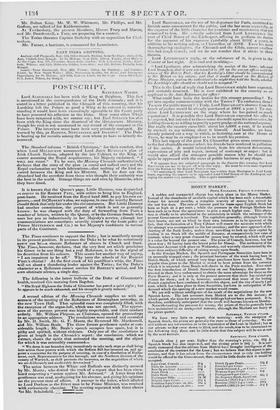A second edition of the Morning Chronicle supplies us with
an account of the meeting of the Reformers of Birmingham yesterday, in -the new Town Hall. That splendid room was completely filled, with the exception of the organ-loft, which was not opened. The appear- ance of the persons present was highly respectable, and their conduct orderly. Mr. William Phipson, as Chairman, opened the proceedings in an appropriate address. The resolutions were moved and seconded by Mr. H. Smith, Mr. G. F. Muntz, the Reverend Mr. Macdonnell, and Mr. William Beale. The three former gentlemen spoke at con- siderable length ; Mr. Beale's speech occupies less space, but it is pithy and spirited, without violence. Only one of the resolutions is given at length in the Chronicle's report : the conclusion, which we extract, shows the spirit that animated the meeting, and the object for which it was ostensibly summoned- " We deem it our bounden duty immediately to take such steps as shall bring into action those powers with which the Reform Bill has invested us, and ap- point a committee for the purpose of securing, in case of a dissolution of Parlia- ment, such Representatives for this borough, and the Northern division of the county of Warwick, as shall promote the measures, on the acquisition of which we are deliberately and unalterably determined," The union between the Whigs and Radicals was distinctly avowed by Mr. hertz ; who denied the truth of a report that has been circu- lated respecting a "union against Mr. Attwood." A letter from that gentleman was read, apologizing for his absence, and giving his opinions on the present state of affairs. A passage iii the letter, which alluded to Lord Durham as the fittest man to be Prime Minister, was received with enthusiastic cheering. The meeting separated with three cheers for Mr. Scholefield. 4111■11 Lord BROUGHAM, on the eve of his departure for Paris, contrived to furnish some amusement for the public, and the bar more especially, at the expense of the little character for prudence and consisteney that yet remained to him. He actually solicited from Lord LvNntluitsT the post of Chief Baron of the Exehequer, offering to perform its duties for the payment of his expenses (probably about 1000/. a year), in addition to his retiring salary, as ('hancellor, of 5000/. Even his most thoroughgoing apologists, the Chronicle and the Globe, cannot swallow this last tutik;li morsel ; and we do not wonder that it sticks in their throats.
Lord LYNDHURST'S reply, or the substance of it, is given in the Courier of last night. It is cool mid insulting- " Lord Lyndhurst, after aeknowledging the receipt of the letter, informed Lord Dominant that it was not intended to fill up the vacant ofiSees until the return of Sir Rolv.rt Peel ; that his Lordship's letter should be communicated to Sir Robert 03 his return; and that it would depend on Sir Robert, if Prime Minister, and on the individual who might then hold the Seals, whether his Lordship's offer should or should not be accepted."
This is the kind of reply that Lord BROUGHAM might have expected, and certainly deserved. He is now exhibited to the country as an applicant to the Anti-kiformers for office ! What could have been the motive for this strange proceeding? To get into regular communication with the Tories ? 4ro embarrass them ? To save the public money ?(Truly, Lord BROUGHAM'S absence from the bench ofjustiee would be cheaply purchased at 5000/. a year.) To out- shine Lord LYNDHURST on the stage where he has gained so much reputation ? It is possible that Lord BROUGHAM expected his offer to be rejected, but intended to throw some discredit upon his adversaries, by holding them up as willing to grad fy a party grudge at the national expense. But really the country cares little about his 5,0001. a year, if he would he content to say nothing about it himself. And besides, we have already pointed out a way in which, as battering-ram at the House of Peers, he may be so employed as to be worth his pension. This last vagary of the poor Ex- Chancellor gives some countenance to the last charitable excuse which his friends have tendered in palliation of his antics. It would indeed draw, from his sternest denouncers, expressions of pity and regret, instead of contempt or anger : but it would also afford the strongest possible reason why he should not again be oppressed with the cares of public business in any shape.
• It appears from the subjoined paragraph in the Courier this evening, that Lord BROUGH A M was not to be pat off with this reply. He must be even more impatient than the Nation for Sir Ronewr PEEL'S Worn.
" We understand, that Lord Brougham has written from Boulogne to Lord Lynd- hurst, repeating his request to be appointed Lord Chief Baron of the Exchequer, awl urging the matter very earnestly. This is quite lamentable."




















 Previous page
Previous page